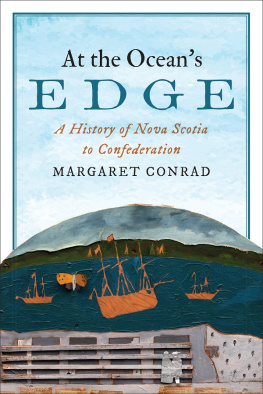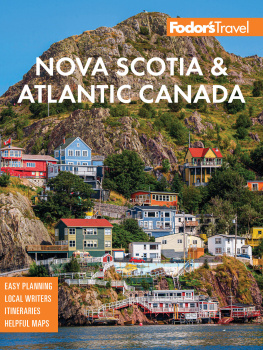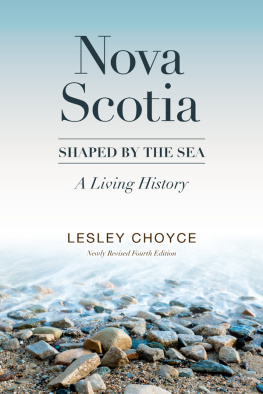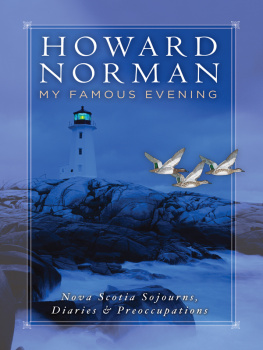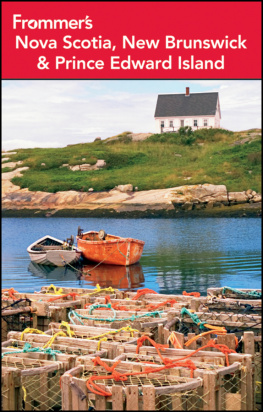
AT THE OCEANS EDGE
A History of Nova Scotia to Confederation
At the Oceans Edge offers a vibrant account of Nova Scotias colonial history, situating it in an early and dramatic chapter in the expansion of Europe. Between 1450 and 1850, various processes sometimes violent, often judicial, rarely conclusive transferred power first from Indigenous societies to the French and British empires, and then to European settlers and their descendants who claimed the land as their own.
This book not only brings Nova Scotias struggles into sharp focus but also unpacks the intellectual and social values that took root in the region. By the time that Nova Scotia became a province of the Dominion of Canada in 1867, its multicultural peoples, including Mikmaq, Acadian, African, and British, had come to a grudging, unequal, and often contested accommodation among themselves. Written in accessible and spirited prose, the narrative follows larger trends through the experiences of colourful individuals who grappled with expulsion, genocide, and war to establish the institutions, relationships, and values that still shape Nova Scotias identity.
(Studies in Atlantic Canada History)
MARGARET CONRAD is professor emerita in the History Department at University of New Brunswick.
STUDIES IN ATLANTIC CANADA HISTORY
Editors: John G. Reid and Peter L. Twohig
This monograph series focuses on the history of Atlantic Canada, interpreting the scope of this field in a way that is deliberately inclusive and accommodating. As well as studies that deal wholly with any aspect of the history of the Atlantic region (or part thereof), the series extends to neighbouring geographical areas that are considered in conjunction with or in parallel with a portion of Atlantic Canada. Atlantic Canadas oceanic or global relationships are also included, and studies from any thematic or historiographical perspective are welcome.
At the Oceans Edge
A History of Nova Scotia to Confederation
MARGARET CONRAD
UNIVERSITY OF TORONTO PRESS
Toronto Buffalo London
University of Toronto Press 2020
Toronto Buffalo London
utorontopress.com
Printed in Canada
ISBN 978-1-4875-3548-3 (cloth) ISBN 978-1-4875-3269-7 (EPUB)
ISBN 978-1-4875-2395-4 (paper) ISBN 978-1-4875-3268-0 (PDF)
Library and Archives Canada Cataloguing in Publication Title: At the oceans edge : a history of Nova Scotia to Confederation / Margaret Conrad.
Names: Conrad, Margaret, author.
Series: Studies in Atlantic Canada history.
Description: Series statement: Studies in Atlantic Canada history
Identifiers: Canadiana (print) 20190236078 | Canadiana (ebook) 20190236086 | ISBN 9781487535483 (cloth) | ISBN 9781487523954 (paper) | ISBN 9781487532697 (EPUB) | ISBN 9781487532680 (PDF)
Subjects: CSH: Nova Scotia History To 1784. | CSH: Nova Scotia History 17841867. | CSH: Nova Scotia Social conditions To 1867. | CSH: Nova Scotia Economic conditions To 1867.
Classification: LCC FC2321 .C66 2020 | DDC 971.6/01 dc23
University of Toronto Press acknowledges the financial assistance to its publishing program of the Canada Council for the Arts and the Ontario Arts Council, an agency of the Government of Ontario.

Contents
Figures
Maps
Tables
I am indebted to a great many historians whose research made this book possible. In particular, I want to thank Raymond Blake, Phillip Buckner, Gregory Kealey, Linda Kealey, Edward MacDonald, and Ged Martin for reading an earlier draft of the concluding chapter, and James Hiller, who, as co-author of four editions of Atlantic Canada: A History, has helped enormously in shaping my thinking on the Atlantic region. Marion Beyea, Susan Blair, Alvin Finkel, Donald Fyson, Julian Gwyn, Sylvia D. Hamilton, Barbara LeBlanc, and Elizabeth Mancke kindly helped to clarify my thinking on specific topics that befuddled me. Above all, I am grateful to John Reid, who checked the English translations of French texts, offered sage advice on two versions of the manuscript, and graciously accepted it as a volume in his Studies in Atlantic Canada series for the University of Toronto Press. The press waited two decades for the manuscript for this book, and in the end I offered only half what was bargained for, offering a good opportunity for another historian to carry Nova Scotias story into the twenty-first century. Len Husband, acquisitions editor at UTP, managed the publication process with generosity and patience, two virtues, he will no doubt concede, that I need to improve upon. Editorial assistant Alexandra Grieve tracked down permissions for photos and maps with impressive efficiency. Freelance editor Barry Norris saved me from a number of embarrassing gaffs, and was as eager as I to bring consistency to the manuscript. Any failures to achieve that end are entirely my fault. I am also grateful to Leah Connor for preparing the manuscript for publication and to Nancy Wills for sparing me the burden of creating an index.
Keep On Keepin On
Nova Scotia Nova Scotia
People elsewhere
often ask where I come from
I answer Nova Scotia.
They say:
But you dont have an accent.
So where are you really from?
Your parents?
and your grand parents?
your great, great grand parents?
Im Nova Scotian
As Nova Scotian as the mayflowers
the Black Refugee women picked.
As the evergreens they shaped into wreaths
As the maple stripped bare for market baskets
As the coal mined by Maurice Ruddick
As the salmon smoked by Willy Krauch
As the stories collected by Helen Creighton.
As tart, or as sweet as Annapolis Valley apples
As grand as Grand Pr sunsets
As steady as Sable Island horses.
As reliable as Beechville blueberries
As breathtaking as the Cabot Trail
As thick as Yarmouth fog
As old as Citadel Hill.
As strong as Fortress Louisbourg
As mysterious as Oak Island
As elegant as the Bluenose.
As beautiful as the souls of our ancestors.
You see, we didnt just get off the boat
And we keep on, keeping on
being Nova Scotian.
Map 0.1. Counties of Nova Scotia, 1867.
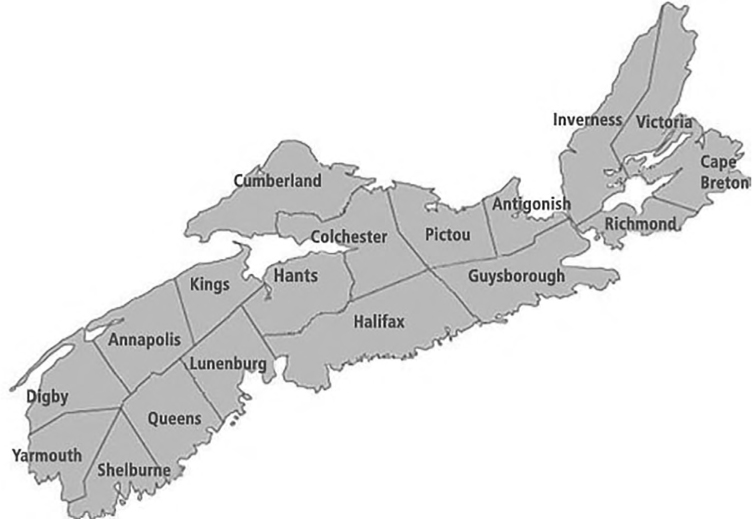
Sylvia D. Hamilton, written as an acceptance speech for the Portia White Prize in 2002, and used as a narration in the in the short film Keep On, Keepin On (Maroon Films Inc., 2004). This poem is published with the permission of Sylvia D. Hamilton and may not be republished without her consent.
As Sylvia D. Hamiltons poem Keep On Keepin On implies, the name Nova Scotia invokes images of fish, flowers, fog, forests, and deeply rooted folk. Her ancestors were among the enslaved Africans who achieved their freedom by fleeing their owners and joining the British side against the United States during the War of 1812. Although they continued to battle racism when they moved to Nova Scotia, the Black Refugees managed to keep on, keepin on. My own ancestors a mix of German-speaking Protestants, New England Planters, and American Loyalists, all of whom arrived in the second half of the eighteenth century also experienced Nova Scotia as a place of opportunity and refuge.
Next page
